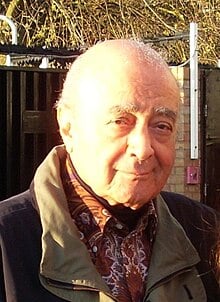LONDON, (Reuters) – More than 400 alleged victims have so far contacted the legal team working on a case against the late Egyptian billionaire Mohamed Al Fayed, who has been accused of sexual abuse and rape, lawyer Dean Armstrong said today.
A BBC documentary in September revealed Al Fayed, who died last year aged 94, sexually abused female staff at his London department store Harrods, forced them to have medical screenings and threatened consequences if they tried to complain.
“The sheer scale of abuse perpetrated by Al Fayed, and facilitated by those around him, sadly, continues to grow,” Armstrong told a news conference in London.
Al Fayed always denied similar accusations raised by other reports before his death. Harrods did not immediately reply to a Reuters request for comment about the lawyer’s comments.
The store has apologised, said it was “appalled” by the allegations, and launched a process for any current or former Harrods employees who wish to claim compensation.
Another lawyer, Bruce Drummond, said the more than 400 claims have been made by women from around the world, mostly from Britain but also from the United States, Australia, Malaysia, Spain, South Africa and other countries.
“That, in our opinion, is an industrial scale abuse,” Drummond said, adding abuse took place “within the walls of Harrods” but also in other locations linked to Al Fayed’s business empire, such as Fulham Football Club, the Ritz Paris and his estate in Surrey.
Victims include the daughter of a former U.S. ambassador to Britain and the daughter of a well-known soccer player, Drummond said, without giving any names.
The BBC documentary said Harrods had failed to intervene and helped to cover up abuse allegations during his ownership.
Lawyers have criticised the Harrods-run compensation scheme, saying some of the victims do not feel comfortable to reach out to Harrods directly for compensation as that is where the abuse unfolded.
Drummond said some senior members of staff from the Al Fayed era still worked at Harrods.
The Financial Times last week reported that four alleged victims had quit the Harrods compensation scheme due to their concerns over potential conflicts of interest and poor communication.
Several media organisations had reported allegations of sexual abuse against Al Fayed before the BBC documentary, including Vanity Fair in 1995, ITV in 1997 and Channel 4 in 2017. Lawyers said in September many of the women only felt able to speak publicly in the BBC report after he died last year.






